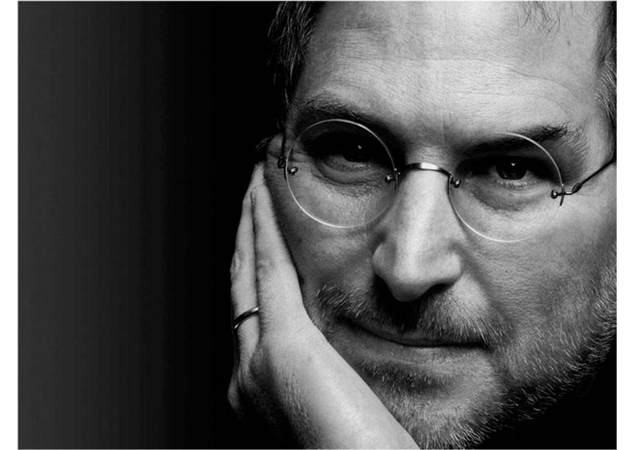The shadow of Steve Jobs in Apple's maps push

These milestones were reached with the steady hand of Timothy D. Cook at Apple's helm, but they seem inseparable from Mr. Jobs. They are the result of initiatives begun during his tenure and, in many ways, reflect his personality one that was perfectionist, competitive, driven and controlling.
Those qualities have remained on display at Apple in the year since his death, most recently in the decision to substitute Apple mapping software for rival Google's in the iPhone 5 and the new iOS 6 operating system, as well as allegations that Apple and book producers conspired to control the price of e-books.
Apple hasn't fully explained its decision to replace Google's maps, but it probably reflects the evolution of the Apple-Google relationship from close allies to fierce competitors, a process that began well before Mr. Jobs's death. Apple also hasn't indicated whether it was carrying out Mr. Jobs's wishes, but the decision seems consistent with his "compulsion for Apple to have end-to-end control of every product that it made," as Walter Isaacson put it in his book "Steve Jobs."
Apple's use of its own mapping technology in the iPhone appears to be a textbook case of what's known as a tying arrangement, sometimes referred to as "bundling." In a tying arrangement, the purchase of one good or service (in this case the iPhone) is conditioned on the purchase or use of a second (Apple maps).
To the degree that tying arrangements extend the control of a dominant producer, they may violate antitrust laws. Probably the best-known example was Microsoft's attempt to bundle its Internet Explorer browser on Windows software, to the disadvantage of Netscape, a rival browser, despite complaints that Explorer was initially an inferior product. This was the linchpin of the government's 1998 antitrust case against Microsoft. E-mails were introduced as evidence in which Microsoft executives indiscreetly stated their intentions to "smother," "extinguish" and "cut off Netscape's air supply" by bundling Explorer with Windows.
Among other findings, the judge ruled that Microsoft had engaged in an illegal tying arrangement. The outcome of the case kept the door open to competition in the browser market. Today, the once-dominant Internet Explorer faces stiff competition from rivals like Mozilla Firefox and Google Chrome. Microsoft's settlement came too late for Netscape's browser, which was no longer being developed or supported after 2007. But Firefox traces its lineage to Netscape's source code.
Could Apple's map suffer a similar fate?
Early users searched for locations and got nonsensical results. Mad magazine ran a parody of the famous Saul Steinberg New Yorker cover of the world seen from Ninth Avenue "now using Apple Maps," in which the Hudson was the Sea of Galilee and other landmarks were ludicrously misidentified.
Mr. Cook swiftly tried to contain the damage. "Everything we do at Apple is aimed at making our products the best in the world. We know that you expect that from us, and we will keep working nonstop until Maps lives up to the same incredibly high standard," he said a week ago.
Would Mr. Jobs have been so quick to apologize? Perhaps not. He was famously resistant to the idea after complaints about the iPhone 4's antenna, and the Apple "genius" manual instructs employees never to apologize for the quality of Apple technology.
Bundling its maps with the iPhone 5 may yet prove to be a strategic blunder for Apple, but it may nonetheless skirt the boundaries of the antitrust laws that tripped up Microsoft. "There's no antitrust theory under which vertically integrating into an inferior component is considered anticompetitive," Herbert Hovenkamp, an antitrust professor at the University of Iowa College of Law, told me. That's because the problem is considered self-correcting by market forces. "There have been lots of complaints about tying arrangements involving inferior products. But ordinarily, incorporating an inferior product doesn't increase your market share, because consumers leave for a better product. It's not a promising strategy," Professor Hovenkamp said. The danger for Apple is that customers will choose an Android phone with a superior Google Maps application rather than an iPhone.
An exception is when a monopolist does it, which is what happened with Microsoft. If a consumer used Microsoft Windows, the dominant software, Explorer was installed by default. "This arose with Microsoft because back then Explorer was considered inferior and quirky," Professor Hovenkamp said. "But that wasn't why it was a violation. It's because consumers had no choice." By contrast, Apple's iOS isn't the dominant smartphone operating system. Apple's software has captured 17 percent of the global smartphone market, compared with 68 percent for Google's Android. Apple users who want Google maps can readily switch to an Android phone. "Most tying arrangement cases have involved firms with close to 100 percent market shares," Professor Hovenkamp noted.
The real test will be whether Apple makes rival mapping apps readily available for downloading on its iPhones. In his apology, Mr. Cook suggested that iPhone users try alternatives, and even suggested using Google maps by going to Google's Web site. Google said it was working on a map application for the iPhone.
From an antitrust perspective, the e-books controversy is more serious. United States antitrust authorities have accused Apple of conspiring with major book publishers to raise e-book prices, and Apple offered to settle a European investigation into the same practices. The Justice Department cited a passage in Mr. Isaacson's book in which Mr. Jobs called the strategy an "aikido move," referring to the Japanese martial art, and said, "We'll go to the agency model, where you set the price, and we get our 30 percent, and yes, the customer pays a little more, but that's what you want anyway."
The charges describe a classic price-fixing arrangement, "which is presumptively illegal," Professor Hovenkamp said. "Everybody wants market dominance, not just Apple. But it's how you go about it. You can't go out and fix prices." Apple has denied the charges, and a trial has been set for next year.
Mr. Cook's challenge has always been to guide Apple out of the shadow of its visionary and charismatic founder. Can he encourage Mr. Jobs's competitive zeal and drive for perfection while distancing Apple from Mr. Jobs's potentially damaging - even unlawful - need to dominate and control? "Historically, Apple hasn't been very sensitive to antitrust issues," Professor Hovenkamp said.
There's no quarreling with Apple's extraordinary success, and Mr. Jobs's obsession with controlling all aspects of Apple's products clearly paid off for its customers and shareholders. It proved to be the right strategy for the time. But competition in smartphones and Apple's other efforts has intensified in the year since Mr. Jobs died, and Apple may not be able to continue blindly down that path. With his swift apology for the imperfections of Apple's maps, Mr. Cook seems to have taken a step in the right direction. If he also settles the e-books case and makes Google's and other map applications readily available to iPhone users, he'd be signaling a clear break from the past and encouraging Apple to embrace, rather than stifle, competition.
Copyright 2012 The New York Times News Service
Get your daily dose of tech news, reviews, and insights, in under 80 characters on Gadgets 360 Turbo. Connect with fellow tech lovers on our Forum. Follow us on X, Facebook, WhatsApp, Threads and Google News for instant updates. Catch all the action on our YouTube channel.
Related Stories
- Samsung Galaxy Unpacked 2026
- iPhone 17 Pro Max
- ChatGPT
- iOS 26
- Laptop Under 50000
- Smartwatch Under 10000
- Apple Vision Pro
- Oneplus 12
- OnePlus Nord CE 3 Lite 5G
- iPhone 13
- Xiaomi 14 Pro
- Oppo Find N3
- Tecno Spark Go (2023)
- Realme V30
- Best Phones Under 25000
- Samsung Galaxy S24 Series
- Cryptocurrency
- iQoo 12
- Samsung Galaxy S24 Ultra
- Giottus
- Samsung Galaxy Z Flip 5
- Apple 'Scary Fast'
- Housefull 5
- GoPro Hero 12 Black Review
- Invincible Season 2
- JioGlass
- HD Ready TV
- Latest Mobile Phones
- Compare Phones
- Realme P4 Lite
- Vivo V70
- Vivo V70 Elite
- Google Pixel 10a
- Tecno Camon 50
- Tecno Camon 50 Pro
- Lava Bold N2
- Vivo V60 Lite 4G
- LG Gram 14 (2026)
- Asus Vivobook 16 (M1605NAQ)
- Infinix Xpad 30E
- Brave Ark 2-in-1
- Amazfit T-Rex Ultra 2
- boAt Chrome Iris
- Xiaomi QLED TV X Pro 75
- Haier H5E Series
- Asus ROG Ally
- Nintendo Switch Lite
- Haier 1.6 Ton 5 Star Inverter Split AC (HSU19G-MZAID5BN-INV)
- Haier 1.6 Ton 5 Star Inverter Split AC (HSU19G-MZAIM5BN-INV)







![[Partner Content] OPPO Reno15 Series: AI Portrait Camera, Popout and First Compact Reno](https://www.gadgets360.com/static/mobile/images/spacer.png)









